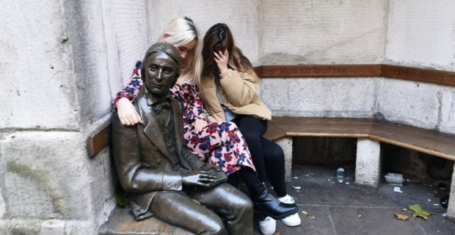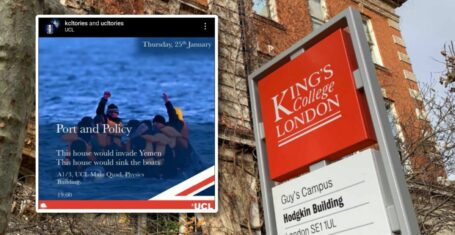
Stop the Music: We spoke to the new student campaign targeting spiking in KCL nightclubs
The campaign wants to introduce a ‘new standard’ for how the uni’s venues respond to spiking and sexual assault
This September, huge flocks of freshers are jumping in on the uni nightlife scene as Covid restrictions have become almost non-existent. But while they don’t have to worry about diseases other than the Freshers’ Flu, going out every night of the week is still anything but safe.
The Tab found in a poll that at least 2,600 students UK-wide have been spiked from the start of term to the end of last October. The London Tab also found in a local poll that 68 per cent of students did not feel safe clubbing in London during the height of the spiking incidents last year.
Because of this, there have been many student-led initiatives to combat spiking and make the night safer for all students. The King’s Tab spoke to a student-led campaign at KCL with some unique policies in mind to help make the desperately-needed changes.
‘A new standard for how nightclubs deter and respond to spiking and sexual assault’
The campaign is called Stop the Music to reflect its “flagship policy”: “stop the music, turn on the lights, and announce suspected cases of spiking” at KCL’s nightclubs.
Students behind the campaign designed it to “respect the right of attendees to know whether they are in immediate danger of being spiked, and open an avenue for the nightclub to investigate and deploy countermeasures before resuming the event.”
They think this is “intentionally transformational” as “nightclubs will have a heavy incentive to develop and enact other measures, as spiking would threaten the nightclub’s reputation and the running of its services.
“With such a policy, spikers will be exposed, knowing that the ground they walk on is fully prepared to launch an immediate and decisive response to their crimes.”

The campaign gathering support at KCLSU’s Freshers’ Fair this year (Credit: Stop the Music Campaign)
The campaign wants this policy (alongside others) to be implemented as “a new standard for how nightclubs deter and respond to spiking and sexual assault” by KCL’s Students’ Union because they think current measures and responses are far from adequate.
They said: “The culture in [university nightclubs] degraded so much last year that the prevalence of spiking and harassment in them became notorious.
“In response, the university and student union have enacted a few new measures (a new reporting tool, drink stoppers, the Ask for Angela Scheme, a new student ‘Welfare Monitor’ etc.). They even committed to piloting one of our campaign policies of employing a first-aid professional during nightclub events.
“But the issue is that all these measures fail to deter spiking and sexual assault from happening in the first place.
“The situation remains that someone can be spiked, traumatised, and the offender is almost guaranteed to walk free – where’s the deterrent? It is also possible that an attendee could be spiked, taken out of the venue, and sexually assaulted, with no concrete barriers to offence. We, therefore, cannot say with sincerity that existing measures protect students from these dangers.
“But our campaign is committed to changing this. We have said it before, but this message must still, upsettingly, be repeated to our university and student union once more: we have provided you with an extensive arsenal of new, decisive measures to protect student safety and assemble heavy deterrents against offenders. Implement them.”
‘We see spiking as a direct result of the rise in violence against women’
Aside from ineffective policies, students behind the campaign think authorities’ attitudes on this issue are also problematic.
They said: “The reports of spiking at our university venues that streamed in during October and November last year were accompanied by promises of a ‘firm response’ from our university and student union. It was therefore equally shocking to us that merely two months later, we as a campaign witnessed cases of spiking at our university campus first-hand but were met by an indifferent security team and crowd.”
This indifference is particularly frustrating as the campaign, mainly initiated by the KCL Intersectional Feminist Society, sees spiking as “a direct result of the rise in violence against women” with a “common intersection with sexual abuse.”
They described gendered violence as “one of the greatest evils in this country,” citing House of Commons statistics that estimate 88 per cent of all needle spiking victims to be women – with 81 per cent of them being students.
They said: “Spiking has become an accepted ‘fact,’ and nightclubbing yet another source of danger. Like taking a walk in the street, women must prepare for violence without structural safeguards.
“But for us, this ‘fact’ is unbearable. Women are being attacked in the street, workplaces, and their own homes. It’s no use waiting for someone to act or another institution to reach enlightenment and champion an end to violence against women.
“This is a danger we must confront ourselves. This is the driving force of our campaign.”
‘There is something we can all do to fight back against gendered violence’
Despite stressing how serious this issue is, students behind the campaign wanted to clarify that they don’t want to “dissuade anyone from attending any event or venue.”
While they advise “looking out for friends and others who may have been spiked and are in serious danger,” they want students, especially freshers, to find comfort in the fact that “there are campaigns such as ours making this demand.”
They said: “The terrifying thing about spiking is that it incapacitates a victim. There is only so much we can do as individuals if we lose the use of our limbs, mental faculties, or are completely unconscious. Ending spiking must be a cooperative effort, with more of us taking responsibility. Placing all the burden of pursuing justice on the ‘victim’ doesn’t work.
“It is important to make informed decisions regarding our safety in the face of the current situation at KCLSU venues, but we are working to change the disproportionate burden of responsibility put on individuals to protect themselves. We deserve better.”
The campaign has already gathered “clear super-majority” support amongst KCLSU clubs and societies, with over 200 written endorsements by society presidents.
For other King’s students keen to support the cause, the Stop the Music Campaign urges them to vote for implementing the proposed policies in an upcoming KCLSU referendum. Non-KCL students can also contribute by helping to facilitate collaboration between the campaign and their own student unions and societies.
They said: “The Stop the Music Campaign aims to bring to the fore what we as students of King’s College London can singularly offer, but there is something we can all do to fight against gendered violence.
“All it takes is a basic sense of empathy and obligation to others.”

The team behind the campaign (Credit: Stop the Music Campaign)
In response to the students’ comments, a KCLSU spokesperson said: “We are committed to tackling the issue of spiking and provide support for students and staff.
“Any cases of spiking and spiking by injection reported to us are fully investigated and perpetrators may face a range of disciplinary measures, as well as policy action where possible. Since the increase in reported incidents across the country in Autumn 2021, KCLSU has taken many preventative steps in our venues including increasing security checks and bag searches, providing ‘spikies’, serving drinks in bottles and cans, the prompt removal of unattended glasses and the ‘Ask Angela’ scheme.
All KCLSU venues staff receive WAVE training (Welfare & Vulnerability Engagement), provided by the Metropolitan Police. Together with KCLSU Advice and Support and other key staff, venues staff also receive training, provided by The Survivors Trust, on taking a trauma informed approach. We have an agreed approach together with the university as outlined here as well as our KCLSU online hub of resources.
We remain committed to making our spaces safe, positive and welcoming for everyone and our Student Officers and staff are in regular contact with student groups and communities who are making a stand against harassment. We have been, and hope to continue, working with the Stop the Music campaign to better understand their and students’ concerns regarding the risk of spiking in KCLSU bars and spaces. We invited members of the campaign group to join a working group we set up to review the headline campaign group’s point. We thank the group for their dedication to the safety of students on our campuses, especially as we feel passionately about ensuring student safety in all our spaces.
We encourage any students attending any events at KCLSU venues who think their drink has been spiked, to report it to our bar and security staff as soon as possible so they can assist. We also strongly encourage students, where they feel comfortable, to report incidents of this nature to the police so that they can carry out a full criminal investigation.”
Related stories recommended by this writer:
• This is how you can tell if your drink has been spiked
• I’m sick of being asked to watch my drink by clubs who don’t seem to care if I get spiked
• ‘This movement is so empowering’: Speaking to the organiser of UCL’s Girls Night In









































